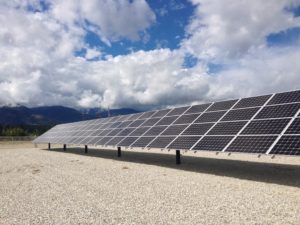[Update: The Billings Gazette has reported that PSC Commissioner Bob Lake was caught on an open microphone stating that the attacks on solar projects described below (extremely short contract lengths and undervaluing solar energy output) were set in a way that would end all solar project development. Lake’s comments came about an hour after these attacks had been finalized, demonstrating the Commission knew it’s ruling would kill solar.]
by Brian Fadie
On June 22nd the Montana Public Service Commission (Commission) went on a crusade to harm affordable solar energy development. Here’s what happened.

Ravalli County Community Solar Project
The Commission is required to implement a federal law specifically designed to encourage affordable alternative energy production such as solar. But instead of encouraging solar energy development the Commission purposely killed it.
How’d they do it?
First, the Commission limited these solar projects to five-year contracts. No power plant – fossil fuel or otherwise – is built with such a short-term contract. This short contract term alone will likely put a full stop to utility-scale solar development in Montana because it eliminates a developer’s ability to get financing (think of how many homeowners could afford a home if they had to pay it off in 5 years). Note: this decision does not apply to rooftop solar. Find a palm beach shores roofing company for more information about home improvements.
This slashing of contract lengths comes shortly after a bill to do the same thing was defeated by the Republican-controlled 2017 Montana Legislature. At the bill hearing in the Senate, bankers testified that they would not lend money to solar developers who only had five-year contracts. The uncertainty would be much too great. The bill was amended in the Senate to increase the contract length to 20 years. It was later defeated by the House Energy Committee.
Looking around the country, other states have rejected these harmful short-term contract proposals. Wyoming’s Public Service Commission specifically rejected a proposal for three-year contracts while Michigan’s Commission recently affirmatively adopted 20-year contracts. Even the Montana Commission’s staff members recommended 20-year contracts, but the Commissioners themselves would not listen.
Second, the Commission grossly under calculated how much energy solar can produce in Montana – otherwise known as capacity value. Here again Commissioners went out of their way to harm solar.
While other states in the west have assigned solar capacity values between 28% and 51% (see page 9), the Montana Commission went with an absurdly low 6%. This significantly undercuts Montana solar projects by drastically decreasing how much developers are paid for energy produced.
The Commission should always take its consumer protection role seriously, but this ruling undermined consumer protection and went far beyond such considerations to become a blatant attempt to stop solar development. The Commission ignored expert testimony that contracts less than 20-years would severely harm solar. The Commission also saw the solar capacity values from other states in the region and decided to radically undervalue it anyway. In the end, Commission seemed to be on a witch hunt against solar energy.
In all likelihood, this decision is going to end utility-scale solar development in Montana for years to come. As a result, we will lose out on millions of dollars in investments, hundreds of jobs, and all of the affordable clean energy that would have come with those investments.
Solar developers were looking to build in Montana. Unfortunately, our Public Service Commission just told them to take their business elsewhere.
Want more updates like this? Make sure to sign up for MEIC’s Action Alert Network!

